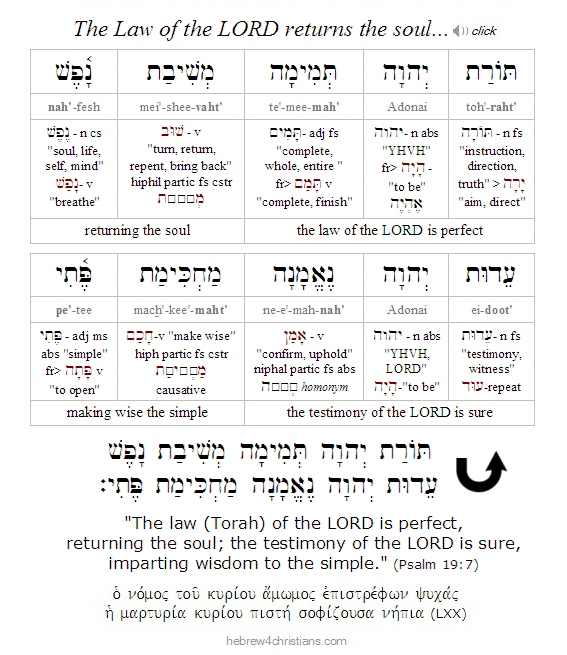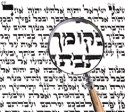|
Each week in synagogues across the world a portion from the Torah (called a parashah) is studied, discussed, and chanted. Jewish tradition has divided the Torah into 54 of these portions - roughly one for each week of the year - so that in the course of a year the entire Torah has been recited during services. The final reading of this cycle occurs on the holiday of Simchat Torah ("Joy of the Torah"), which immediately follows the holiday week of Sukkot. On Simchat Torah, we celebrate both the completion of the year's Torah Reading cycle as well as the start of a brand new cycle. Each Jewish year, then, we "rewind" the scroll and begin again. The sages have wisely said that you cannot compare studying Torah for the 49th time to studying it for the 50th time....
Our spiritual inheritance is bound up with the Torah: it is part of our story, our history, our heritage (Gal. 3:7; Rom. 4:16; Luke 24:27). The stories of Torah serve as parables and allegories that inform the deeper meaning of the ministry of Messiah: "Now these things happened to them as an example, but they were written down for our instruction, on whom the end of the ages has come (1 Cor. 10:11). "For whatever was written in former days was written for our instruction, that through endurance and through the encouragement of the Scriptures we might have hope" (Rom.15:4). "All Scripture is inspired by God..." which refers first of all to the Torah, the Writings, and the Prophets which attest to the Messiah (2 Tim. 3:16-17). You are therefore no longer a stranger or outsider to the heritage of the LORD but a partaker of the covenantal blessings (Eph. 2:12,19). Disciples of Yeshua are called talmidim (ū¬ų╝ųĘū£ų░ū×ų┤ūÖūōų┤ūÖūØ) -- a word that comes from lamad (ū£ųĖū×ųĘūō) meaning "to learn." Among other things, then, following the Messiah means becoming a student of the Scriptures He loved and fulfilled (Matt. 5:17-18; Luke 24:44-45). Only after learning from Yeshua as your Teacher will you be equipped to "go to all the nations and teach" others (Matt. 28:19).
We read V'zot HaBerakhah ("this is the blessing") at the end of Simchat Torah, which is the final portion of the entire Torah itself... After reading this portion, we "rewind the scroll" back to the beginning to begin reading parashat Bereshit. We do this every year because Talmud Torah - the study of Torah - is an ongoing venture in the life of a Jew. In this connection, it is interesting to note that the very first letter of the Torah is the Bet (ūæų╝) in the word bereshit (ūæų╝ų░ū©ųĄūÉū®ūüų┤ūÖū¬), and the very last letter of the Torah is the Lamed (ū£) in the word Israel (ūÖų┤ū®ūéų░ū©ųĖūÉųĄū£). Putting these letters together we get the word lev (ū£ųĄūæ), "heart," suggesting that the entire Torah - from the first letter to the last - reveals the heart and love of God for us... Moreover, the first letter of Scripture is a Bet (ūæų╝), as explained above, and the last letter is a Nun (ū¤) in the word "Amen" (ūÉųĖū×ųĄū¤), so the whole Bible - from beginning to end - reveals the Person of God the Son (ūæų╝ųČū¤) for us...
Since we are about to begin the Torah again for a new year, it is worthwhile to remind ourselves about how the Torah itself begins... In this connection we note that it speaks from an omniscient, "third person" perspective. When we read, "In the beginning, God (ūÉų▒ū£ūöų┤ūÖūØ) created the heavens and the earth," we must ask who exactly is speaking? Who is the narrator of the Torah? The very next verse states that the Spirit of God (ū©ūĢų╝ūŚųĘ ūÉų▒ū£ūöų┤ūÖūØ) was hovering over the face of the waters (Gen. 1:2), followed by the first "direct quote" of God Himself: i.e., "Let there be light" (Gen. 1:3). The creative activity of Elohim (God) and the presence of Ruach Elohim (the Spirit of God) are therefore narrated by an omniscient Voice or "Word of God." Obviously the Spirit of God is God Himself (who else?), just as the Word of God is likewise God Himself, and therefore the first verses of the Torah reveal the nature of the Godhead. God is One in the sense of echdut, "unity," "oneness," and and so on, though not "one" in the monistic sense of a solipsistic mind (╬Į╬┐ß┐”Žé). God is beyond all theological predications: there can be no sense of "person" apart from relationship, and therefore God's Personhood entirely transcends all our finite conceptions - and yet God forever is One....
Hebrew Lesson
Psalm 19:17 Hebrew reading (click):
 |
|


